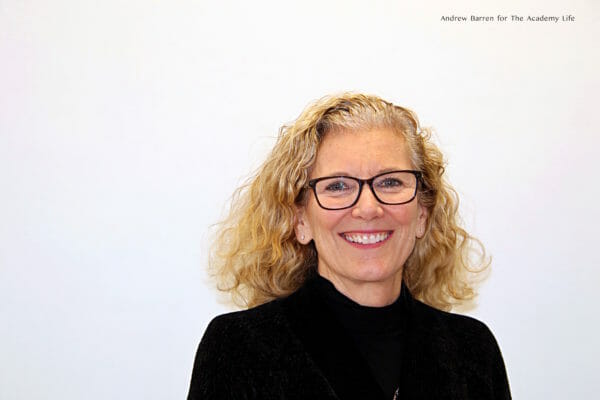Dr. Suzanne Ritter, Upper School psychologist. (Andrew Barren’ss/Media editor)
The pursuit of a meaningful and fulfilling life is an awareness and a practice our Academy administrators and teachers believe is just as important as our academic, artistic, and athletic pursuits, particularly in our developing years as high school students. Our questionnaires on personal issues and the discussions of “kindness” and “selflessness” are meant to replace unhappiness with hope and optimism.
The mentality of settling for neutrality; that is, feeling that things are just okay is typical since most of psychology focuses on addressing anxiety and depression. While these fields are critical, there are limited discussions on how to be even better or “pushing north of neutral.” Giving value to our purpose in life instead of settling for “everything is just okay” is one goal of positive psychology, which strives to make individuals prosper and live their lives with purpose.
Positivity includes meaningful engagement and accomplishment, which are vital elements to help us attain a meaningful life and allow us to move past feeling simply “all right” to flourish and thrive.
Positive psychology has proven to increase happiness and establish life-long strengths for our well being now and as we become adults. Understanding the benefits of creativity, a love of learning, humility, and gratitude can lead to living a better and more fulfilling life.
The more our Upper School psychologist, Dr. Ritter, recognized how much we needed to move away from feeling mediocre on some or most days and truly recognize what we are good at and discovering our meaning and our purpose, the more she pursued working with experts who teach these applications in educational environments.
Last summer Ritter did just that as Lower School teacher, Mrs. Schroeder, and she received Academy’s “Dream Big Grant,” which is designed to fund teachers’ pursuits in educational subjects that can enrich the school.
Ritter and Schroeder first engaged in a six-month, 240 hour program in Washington D.C. to achieve their certifications in Applied Positive Psychology.
Following their training, Ritter and Schroeder traveled to Geelong College in Victoria, Australia, to master the ways of integrating the principles of positive education into Academy’s culture and curriculum.
Ritter said that Schroeder and she “observed how character strength-based approaches are used in educating students.” Instead of focusing only on students’ strengths in academic subjects, the benefits of highlighting students’ character and integrating these strengths into the classroom can help us learn to expand our perspectives by shaping how we think, how we feel, and how to counter negative emotions and adversity.
Ritter and Schroeder are in the throes of incorporating various practices of positive education into Academy’s curriculum, with the aim of propelling those in the community “north of neutral” and on “a path towards flourishing.”
Rather than seeing the 8:05 am bell with the mentality of just getting through the day, students and teachers alike can see the 8:05 am bell as the start of another opportunity.








